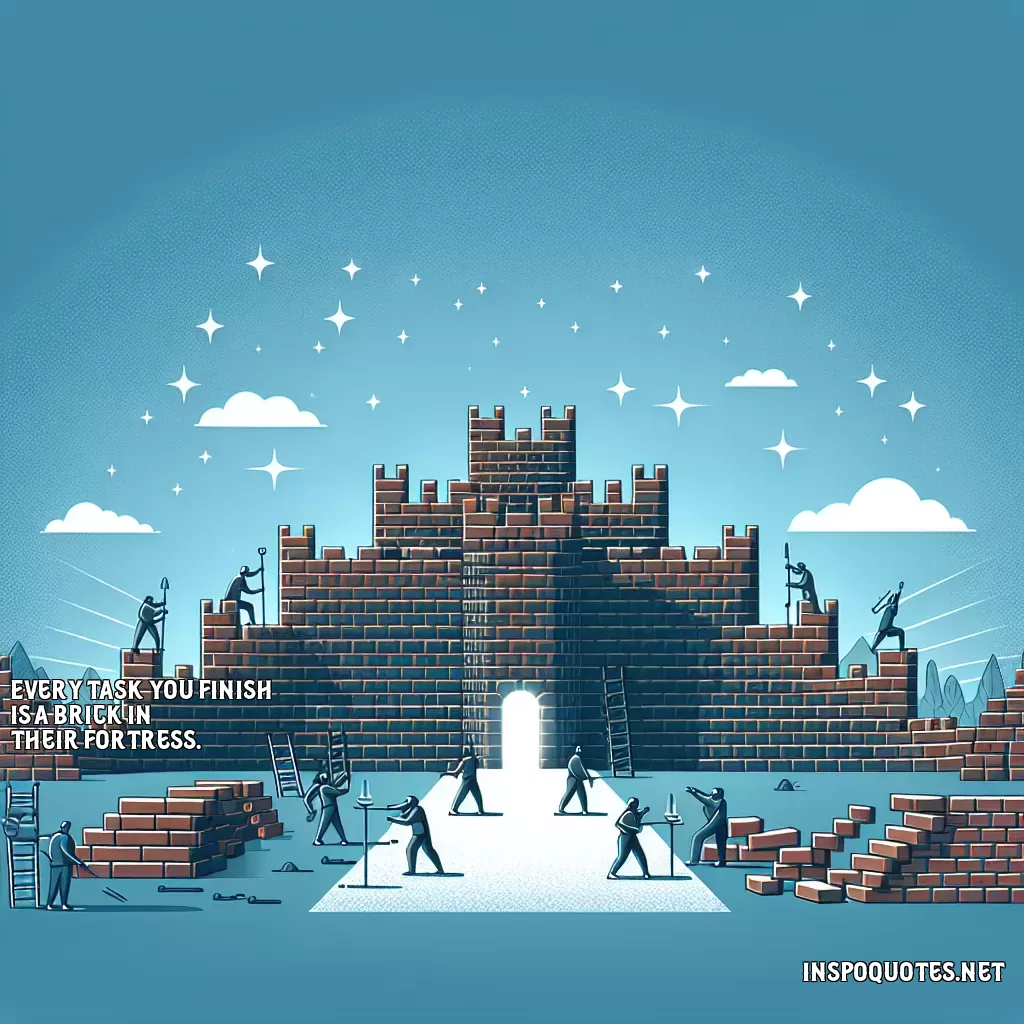
Every task you finish is a brick in their fortress.
Author: Hugh Howey
👁️ 9 views
The quote "Every task you finish is a brick in their fortress" can be interpreted in several meaningful ways, and the imagery used is particularly powerful. At its core, this quote suggests that each completed task contributes incrementally to a larger goal or structure. Let's unpack this by examining the components and symbolism involved. Firstly, the phrase “every task you finish” emphasizes the importance of individual tasks, no matter how small they may seem. Each task represents effort, dedication, and progress. Completing tasks, whether large or small, is fundamental to achieving success and realizing objectives. The metaphor of a "brick" suggests that each task is a building block. In construction, bricks are used to create sturdy and enduring structures. Similarly, each task contributes to the sturdiness and integrity of a greater goal or project. It highlights the cumulative power of small efforts and how they collectively strengthen and support the whole. The "fortress" represents the ultimate goal or the overarching structure that these tasks support. A fortress is strong, protective, and defensive; it withstands external pressures and provides a sense of security. When looked at from an organizational perspective, it might symbolize the overall mission or strategic objective that a team or organization is trying to achieve. In a personal context, the fortress could symbolize one's personal growth, achievements, or legacy. Therefore, this quote calls attention to the idea that persistence and consistent effort in completing tasks, even the seemingly minor ones, are essential for building something substantial and enduring. It prompts us to recognize the value of diligence and foresight in our everyday tasks as essential components of success.
Quote By: Hugh Howey
Hugh Howey is an American author best known for his compelling science fiction works, particularly his bestselling series, "Wool." Born on June 23, 1975, in North Carolina, Howey developed a passion for storytelling at a young age. He pursued his education at Florida State University, where he studied creative writing and fine arts. After graduating, he took on various jobs, including a stint as a yacht captain, while honing his craft as a writer.
Howey first gained attention in the literary world with his self-published novella "Wool," which was released in 2011. The novella quickly captured the imagination of readers, leading to a series of sequels that would form the "Silo" series. The story is set in a post-apocalyptic future where humanity lives underground in a giant silo, exploring themes of survival, trust, and the nature of authority. The success of "Wool" propelled Hugh Howey into the spotlight, illustrating the potential of self-publishing in the digital age. His unique approach to marketing and engagement with fans helped him build a loyal readership and eventually catch the attention of major publishing houses.
Howey's writing is characterized by its intricate world-building and deeply human characters, often reflecting his fascination with technology’s impact on society. His work transcended the confines of traditional publishing; "Wool," along with its sequels, has been translated into multiple languages and adapted into various media formats, including film and television.
In addition to the "Silo" series, Hugh Howey has written numerous other novels, including "Shift" and "Dust," which complete the trilogy, as well as standalone works such as "Beacon 23" and "The Plagiarist." An advocate for authors’ rights and the future of independent publishing, Howey frequently participates in discussions about the evolving landscape of the literary world. Through his innovative storytelling and entrepreneurial spirit, Hugh Howey continues to inspire both readers and aspiring writers everywhere.